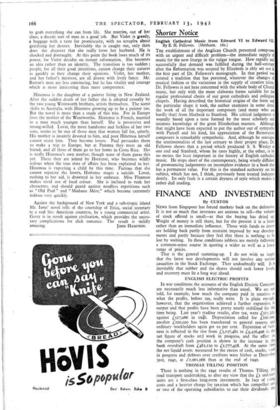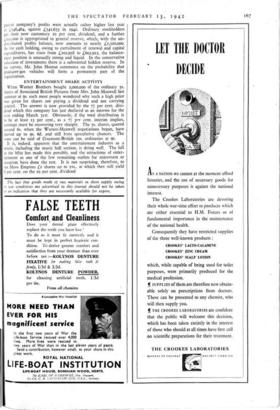FINANCE AND INVESTMENT
By CUSTOS
NEWS from Singapore has forced markets back on the defensive. It is not so much that investors are anxious to sell—the volume of stock offered is small—as that the buying has dried up. Weight of money is still there, but for the present it is a latent rather than an immediate influence. Those with funds to invest are holding back partly from restraint imposed by war develop- ments and partly because they feel that there is nothing to be lost by waiting. In these conditions jobbers are merely following a common-sense course in quoting a wider as well as a lower range of prices.
That is the general summing-up_ I do not wish to imply that the latest war developments will not involve any serious casualties in the Stock Exchange. They undoubtedly will. It is inevitable that rubber and tin shares should seek lower levels, and recovery must lie a long way ahead.
ENGLISH ELECTRIC PROFITS
In war conditions the accounts of the English Electric Compaq are necessarily much less informative than usual. We are not told, for example, how much the company paid in taxation or what the profits, before tax, really were. It is plain enough, however, that the organisation achieved a further expansion in output and that profits have been pretty nearly stabilised for the time being. Last year's trading results, after tax, were £515,321, against £517,066 in 146. Depreciation called for £roo,o00, another £roo,000 has been transferred to general reserve and ordinary stockholders again get to per cent. Expansion of busi- ness is reflected' in the rise from £3,157,481 to £4,426,406 in the net figure of stocks and work in progress, and the effect 00 the company's cash position is shown in the increase in the bank overdraft from £483,150 to £1,777,428. At the same time the net liquid assets measured by the excess of cash, stocks, work in progress and debtors over creditors were hieher at December 31st, 1941, at f 2.o6;,o66 than at the end of 194o.
THOMAS TILLING POSITION There is nothing in the 1941 results of Thomas Tilling, the road transport undertaking, to alter my view that the £1 ordinaly units are a first-class long-tern investment. In face of rising costs and a heavier charge for taxation which has compelled one or two of the operating subsidiaries to cut their dividends, the
parent company's profits were actually rather higher last year at y..:546,464, against £541,633 in 194o. Ordinary stockholders ¢et their now customary ro per cent. dividend, and a further ktco.000 is appropriated to general reserve, which, with the un- distributed profits balance, now amounts to nearly L1,500,000. As the cash holding, owing to curtailment of renewal and capital expenditures, has risen from £202,958 to £602,912, the balance- sheet position is unusually strong and liquid. In the conservative saluation of investments there is a substantial hidden reserve. In his survey, Mr. John Heaton comments on the probability that producer-gas vehicles will form a permanent part of the organisation.
ENTERTAINMENT SHARE ACTIVITY
When Warner Brothers bought 2,000,000 of the ordinary 5s. shares of Associated British Pictures from Mrs. John Maxwell last summer at 9s. each most people wondered why such a high price was given for shares not paying a dividend and not carrying control. The answer is now provided by the 71 per cent. divi- dend which this company has just declared as an interim for the year ending March 31st. Obviously, if the total distribution is to be at least 15 per cent., as a 7t per cent. interim implies, earnings must be recovering very sharply. The 5s. shares, quoted around 6s. when the Warner-Maxwell negotiations began, have moved up to 9s. 6d. and still have speculative chances. The same can be said of Gaumont-British los. ordinaries at 9s.
It is, indeed. apparent that the entertainment industry as a whole, including the music hall section, is doing well. The lull in the blitz has made this possible, and the attractions of enter- tainment as one of the few remaining outlets for enjoyment or escapism have done the rest. It is not surprising, therefore, to see Moss Empires fr shares up to 2s., at which they still yield S per cent. on the ro per cent. dividend.



























 Previous page
Previous page